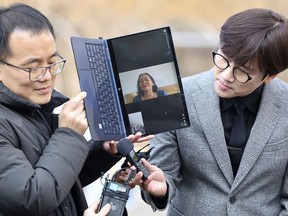
SEOUL, South Korea (AP) — A South Korean court on Tuesday ordered the government to pay 30 million won ($24,000) to a Vietnamese woman who survived a gunshot wound but lost several relatives when South Korean marines rampaged through her village during the Vietnam War in 1968.
In awarding the compensation to 62-year-old Nguyen Thi Thanh, the Seoul Central District Court dismissed the government’s argument that it was unclear whether South Korean troops were responsible for the slaughter in the village of Phong Nhi.
Sign up to receive the daily top stories from the National Post, a division of Postmedia Network Inc.
Thanks for signing up!
A welcome email is on its way. If you don't see it, please check your junk folder.
The next issue of NP Posted will soon be in your inbox.
The court also rejected the government’s argument that civilian killings were unavoidable as the Korean troops were dealing with Viet Cong guerrillas who often blended with locals, according to Thanh’s lawyer, Lim Jae-sung.
The ruling marks the first time a South Korean court found the country’s government responsible for mass killings of Vietnamese civilians during the war, and could potentially open the way for similar lawsuits. Then ruled by anti-communist military leaders, South Korea sent more than 320,000 troops to Vietnam, the largest foreign contingent fighting alongside U.S. troops.
South Korea’s Justice Ministry didn’t immediately respond to a query whether the government will appeal.
According to U.S. military documents and survivors, more than 70 people were killed and around 20 others injured after South Korean marines allegedly fired at unarmed civilians during search operations at Phong Nhi and the nearby village of Phong Nhut in February 1968.
Thanh, then 7 years old, was treated for gunshot wounds in her stomach while five of her family members died, including her mother, sister and brother. She filed the lawsuit against the South Korean government in 2020 and testified at the Seoul court last August.
The trial also included the testimonies of other Vietnamese villagers and South Korean war veteran Ryu Jin-seong, a member of the marine unit linked to the attacks in Phong Nhi and Phong Nhut. He provided a first-hand account of how the Korean soldiers shot at unarmed civilians, many of them children and women.
Thanh, who awaited the ruling in Vietnam, said she was “overjoyed” by her court win.
“I think that the souls (of those who died in Phong Nhi) were always with me and supported me,” she said in a video message translated by her legal team. “I am overjoyed because I think that the souls can now rest easy.”
The South Korean government had argued there was no conclusive evidence that South Korean troops were responsible for the killings, even suggesting that the aggressors may have been Viet Cong fighters disguised in Korean uniforms and attempting psychological warfare.
The government also insisted that even if Korean soldiers were involved, their aggressive response was understandable when they were facing constant threats from Viet Cong guerrillas, who often hid themselves among locals and actively recruited young women.


